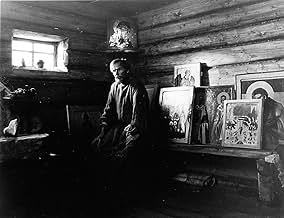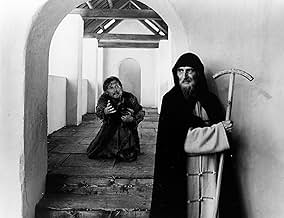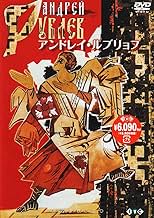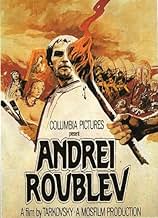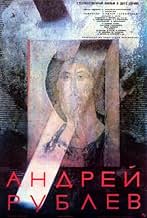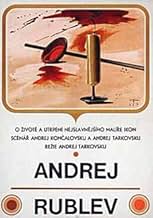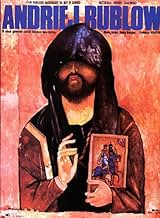Andrej Rublëv narra la vita del grande pittore di icone vissuto in Russia nel turbolento XV° secolo, epoca marcata da sanguinosi conflitti tra pincipi rivali e dalla terribile invasione dei ... Leggi tuttoAndrej Rublëv narra la vita del grande pittore di icone vissuto in Russia nel turbolento XV° secolo, epoca marcata da sanguinosi conflitti tra pincipi rivali e dalla terribile invasione dei Tartari.Andrej Rublëv narra la vita del grande pittore di icone vissuto in Russia nel turbolento XV° secolo, epoca marcata da sanguinosi conflitti tra pincipi rivali e dalla terribile invasione dei Tartari.
- Regia
- Sceneggiatura
- Star
- Premi
- 4 vittorie e 1 candidatura in totale
- Durochka
- (as Irma Raush)
- Patrikey, monakh
- (as Yu. Nikulin)
- Skomorokh
- (as R. Bykov)
- Stepan, sotnik Velikogo knyazya
- (as N. Grabbe)
- Foma, monakh
- (as M. Kononov)
- Starshiy liteyshchik
- (as S. Krylov)
- Tatarskiy khan
- (as B. Beyshenaliev)
- Aleksey, monakh
- (as A. Obukhov)
- Sergey
- (as Volodya Titov)
- Efim
- (as N. Glazkov)
Recensioni in evidenza
Fortunately for us, this movie, recently rereleased in a DVD transferred from a pristine 35mm print, may now be viewed intact, and it is one of the great triumphs of mankind's stay on the planet. It is a masterpiece almost without flaw. The beautiful painterly images follow one another in breathtaking succession. At least three of the eight chapters, if taken individually, could stand alone as separate masterpieces.
The ostensible subject is the life of Andrei Rublev, a 15th century monk who is renowned as Russia's greatest creator of religious icons and frescoes. Rublev himself, however, is merely a useful device. Little is known about him, and most of the episodes in the movie come straight from Tarkovsky's imagination of what might have been. Sometimes one must ignore the facts to get to the truth.
The movie is not about one talented monk, but about Russia, and Rublev stands in as a useful symbol since he lived in a time when he could personally witness two of the key elements in the development of Russia's unique culture: the growing force of Byzantine Christianity, and the Mongol-Tatar invasions. In addition he was an artist and a thinker, and experienced first-hand the difficulty of following those paths in Russia. Rublev's own inner conflicts allow the filmmaker to illuminate thoughts on the pagan and the sacred, the nature of art, the relationship of the artist to the state, what it means to be Russian, and what it means to be human.
It is beautiful, mystical, and profound, but the truly inspiring aesthetics are matched with complete technical wizardry. I simply don't know how some of the shots were created. One I do understand, and stand in awe of, is a continuous single camera shot, just before the church door is breached by Tatar invaders, which involves action in several different locations at multiple elevations as well as the correct timing of hundreds of extras and horses. It makes the first scene of Touch of Evil look like a high school film project.
It is a difficult movie to follow. One might liken it to James Joyce's Finnegan's Wake as a work of genius so monumental and complex, and so disdainful of traditional narrative form, that it requires extensive thought and study to understand it. And even after studying it, watching it repeatedly, and reading Tarkovsky's own comments about it, one still finds it opaque in many ways.
Tarkovsky was free to create the work of art he wanted, without concern for profit. The original 205 minute cut was also free from outside censorship. He used this freedom to realize his personal artistic vision. There is no other movie like it, and there may never be. Score it 11 out of 10.
The medieval society was deeply religious. The church influenced every aspect of people's lives from birth to death and was part of the state. It means religious leaders were as important as rulers.
In Russian society men were wearing beards and women covered hairs. Remove a beard from a man or uncover woman's hair and you will humiliate them, they would feel like modern people being undressed in public.
Paganism is a form of religion, where people believe in many gods instead of one. The main Russian pagan gods are the goddess of the earth and the god of the sun. Among others - the god of storms and lightning, the mythical young women living in forests and rivers. Despite many centuries of suppression of paganism by authorities some in modern Russia still celebrate the feast of Ivan Kupala (which could be translated as Ivan Gathering) depicted in the movie.
Also I have to mention, that Soviet censors told Tarkovski the movie is too cruel. They told him the scene with a burning cow, for example, is absolutely unacceptable. Tarkovski tried to defend the movie. The cow wasn't harmed, was his reasoning. Still the film was cut. The censors knew better what is good and what is not for the viewer.
This brings us to what is the message of Tarkovski in this film. There are many messages actually. I'll be telling only about one here, because it is not hidden. It is there, in the dispute between Rublov and Theophanes The Greek. They both are talented, both want to bring people to humanity. Theophanes is tired, he says - common people live in darkness, they are completely consumed by sin and the only way to make them humans is to scare them and punish them. Rublov advocates for love. He says: people live very difficult life, it's amazing how they endure it. We have to love them, to remind them, they are humans, they are Russians. You see, the first is the position of the Soviet system, the second - of Jesus Christ.
Me? I'm still sitting on the fence. :)
I recommend to watch this movie many times. You will do it without my recommendation though, if you (like me) will not understand everything from the first view and you like to think. The mesmerizing beauty of this movie will help you to return easier. For the first time be prepared for not a cakewalk. There are two things to consider here. One is the cruelty. Though it is absolutely necessary in this film, most of us living in a comfort of modern society are not ready to it. The other is the pace. Often it is a pace of real life.
Peace.
There are no cliches here, no stereotypes and no sucking up to the audience. A brutally honest and yet very moving, touching and optimistic film. And it is not about the nature of a genius. Rather, it is about a man's ability and duty to preserve and be true to his humanity, his freedom, his soul, his heart and his gift, no matter what century it is or what the circumstances are. Watch it to remind yourself of what it really means to be human.
But there is another thread, one that eschews selfaware structure -- where idea is anathema. Nature is celebrated. Rich intuition and meditative spontaneity are sufficiently nutritious in some hands, but these are amazingly few. The so-called 'new wave' tried it, at least initially. Lots of other appearances as well, mostly failures, some lovely. Among the attempts, I know of only two filmmakers who have mastered this tricky approach of avoiding knowledge: Tarkovsky and Malick. Of these, Malick is more abstractly sensual.
After all, Tarkovsky must deal with that dark cloth of Russian self-pity, that tradition of grand themes and epic fate, something which does not burden Malick. So the metaphoric content is heavy. That's fine, an acceptable skeleton for a nearly three hour meditation. All is self-referential: a set of images about an imagemaker: the actor's wife played the retarded girl who factors so importantly. During the production he was cheating on her with who was to become his second wife. The girl goes off with a Tartar, leaving Rublev. Many other scenes refer to Rublev's situation, resolved by Tarkovsky's action. For instance, we have a sequence where Rublev hesitates to paint a scene of fateful pain. This is followed by Tarkovsky doing just that. The extension of metaphor among parts of the film (ballooner and bellringer to Rublev's story) extends from the film to the filmmaker and thence from him to us.
What I found even more interesting was his confidence in complex compositions and long, long multiperspective tracking shots. Compared to other swoopers, this camera seems curious, impetuous, not at all as if the shots were planned. Hard to believe it is only his second feature. This alone expands one's imagination with only a couple viewings, but combined with the notion of folded metaphor (including visual metaphor) it becomes a truly great and singular work.
(Some classical symmetries touch multiple places: a jester within the play; solitude in the context of relationship; creating in the unknown; broken symmetry through one twin killing another. Some new ones: pagan fire and water underlying ritual exuberance, either sex or religious art.)
Alas, the DVD has a discouragingly vapid commentary. But then I guess that's the whole point, and with the loss of potatohead Soviets, we need to substitute the next best thing.
Tarkovsky wanted to make art that would change people's lives and in this he succeeded. Although his life was troubled and his projects clawed into life randomly from the grip of his film studio bosses, when viewed as a whole they seem to be all part of some great plan that was meant to reach fruition right from the start. He believed that ultimately it is best to do things that deepen one's inner life rather than impoverish it. That may explain why you leave most Hollywood films feeling soiled. There are too many great scenes and moments in this astonishing and monumental work to mention so I won't. Suffice it to say it would have been fascinating to have seen what Tarkovsky would have made had he lived and returned from exile to his homeland. Recent events in Russia and the Balkans make this film even more vital and pertinent today.
The trouble is Tarkovsky's films have such extraordinary purity and spiritual depth that no other films seem able to satisfy one in the same way. They seem flat, lifeless and unable to compete. Why watch the let's-pretend-grown ups like Tarantino when you can watch a real grown up? So like I said, Bloody Tarkovsky. He has ruined cinema for me.
Lo sapevi?
- QuizFilm debut of Anatoliy Solonitsyn, and the first of four movies he made together with director Andrei Tarkovsky before his death from cancer in 1982. Had Solonitsyn lived, he would also have played protagonist Andrei Gorchakov in Tarkovsky's Nostalghia (1983), as well as star in a project titled 'The Witch' which eventually became Tarkovsky's final production, Sacrificio (1986).
- BlooperThe smoothly-cut logs that feature many times in the early scenes are clearly cut with machinery not available in the early fifteenth century.
- Citazioni
Andrei Rublyov: You just spoke of Jesus. Perhaps he was born and crucified to reconcile God and man. Jesus came from God, so he is all-powerful. And if He died on the cross it was predetermined and His crucifixion and death were God's will. That would have aroused hatred not in those that crucified him but in those that loved him if they had been near him at that moment, because they loved him as a man only. But if He, of His own will, left them, He displayed injustice, or even cruelty. Maybe those who crucified him loved him because they helped in this divine plan.
- Versioni alternativeSoviet television created a severely trimmed 101-minute version that the director did not authorize. Notable scenes removed from this version were the raid of the Tatars and the scene showing naked pagans. The epilogue showing details of Andrei Rublev's icons was in black and white as the Soviet Union had not yet fully transitioned to color TV.
- ConnessioniEdited into Ombres vives ...une autre histoire du cinema... (2013)
I più visti
- How long is Andrei Rublev?Powered by Alexa
Dettagli
- Data di uscita
- Paese di origine
- Lingue
- Celebre anche come
- Andrej Rubliov
- Luoghi delle riprese
- Aziende produttrici
- Vedi altri crediti dell’azienda su IMDbPro
Botteghino
- Budget
- 1.000.000 RUR (previsto)
- Lordo Stati Uniti e Canada
- 124.189 USD
- Fine settimana di apertura Stati Uniti e Canada
- 11.537 USD
- 15 set 2002
- Lordo in tutto il mondo
- 180.956 USD
- Tempo di esecuzione
- 3h 9min(189 min)
- Colore
- Mix di suoni
- Proporzioni
- 2.35 : 1


